The 2024 Recognition Survey Report
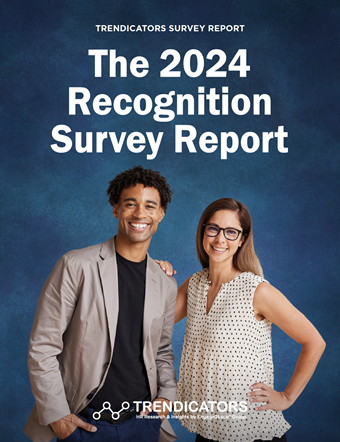
Introduction
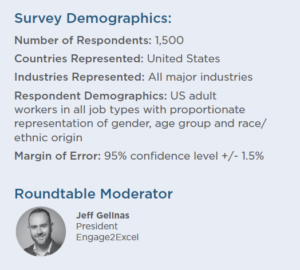 Welcome to the 2024 Recognition Survey Report, an analysis of the perceptions and preferences of employees across all major industries in the U.S. produced by Trendicators™, the research division of Engage2Excel Group; this report is based on survey responses from 1,500 job seekers in February 2024.
Welcome to the 2024 Recognition Survey Report, an analysis of the perceptions and preferences of employees across all major industries in the U.S. produced by Trendicators™, the research division of Engage2Excel Group; this report is based on survey responses from 1,500 job seekers in February 2024.
The report reveals insights into key topics to enhance your organization’s recognition strategies and programs to improve engagement, performance and retention. Key takeaways from our roundtable discussion with members of the Trendicators Advisory Board are presented on page 8.

Download
 hbspt.cta.load(123973, 'a0754c01-d04e-402f-8670-13acf88f0f23', {"useNewLoader":"true","region":"na1"});
hbspt.cta.load(123973, 'a0754c01-d04e-402f-8670-13acf88f0f23', {"useNewLoader":"true","region":"na1"});
THE BUSINESS CASE FOR RECOGNITION
An abundance of industry research has documented the positive business impacts of employee recognition. For example, a survey of executives by Harvard Business Review found that 78% of respondents believed employee recognition positively impacts employee retention. And WorldatWork reported that 58% of companies with recognition programs observed increased employee engagement.
We were curious, however, about employee perceptions of the business benefits of specific types of programs: performance recognition and service/career milestone awards. As shown below, more than three-quarters of survey respondents believe these programs positively influence employee engagement and retention. However, nearly half say that either their employers don’t offer such programs or they are unaware of whether such programs exist.
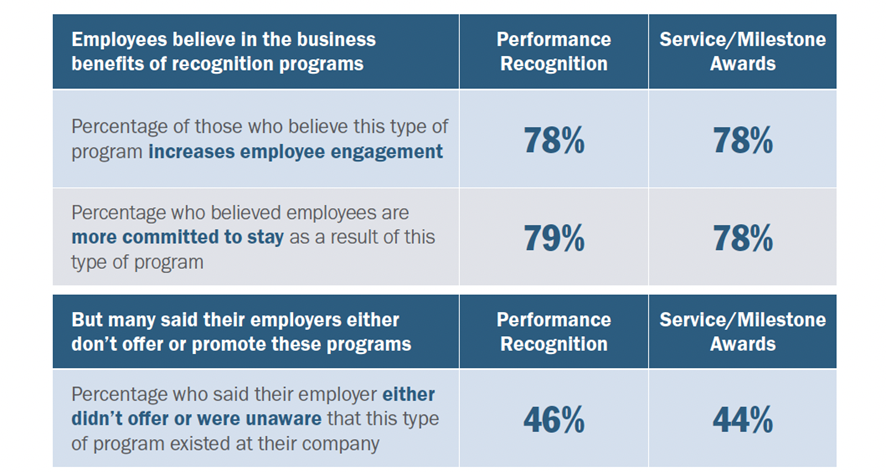
Download
 hbspt.cta.load(123973, 'a0754c01-d04e-402f-8670-13acf88f0f23', {"useNewLoader":"true","region":"na1"});
hbspt.cta.load(123973, 'a0754c01-d04e-402f-8670-13acf88f0f23', {"useNewLoader":"true","region":"na1"});
RECOGNITION PREFERENCES
After reviewing survey results on the types of recognition employees prefer and how often they wish to be recognized, our advisory board members shared their interpretations. Knowing that recognition by an immediate supervisor has the greatest impact on performance, all agreed that the survey reflected a need for training to help managers improve their recognition skills. With regard to preferences for frequency of recognition, our experts pointed out that while frequency is important, recognition is personal, and timely recognition for specific behaviors and accomplishments is most important.
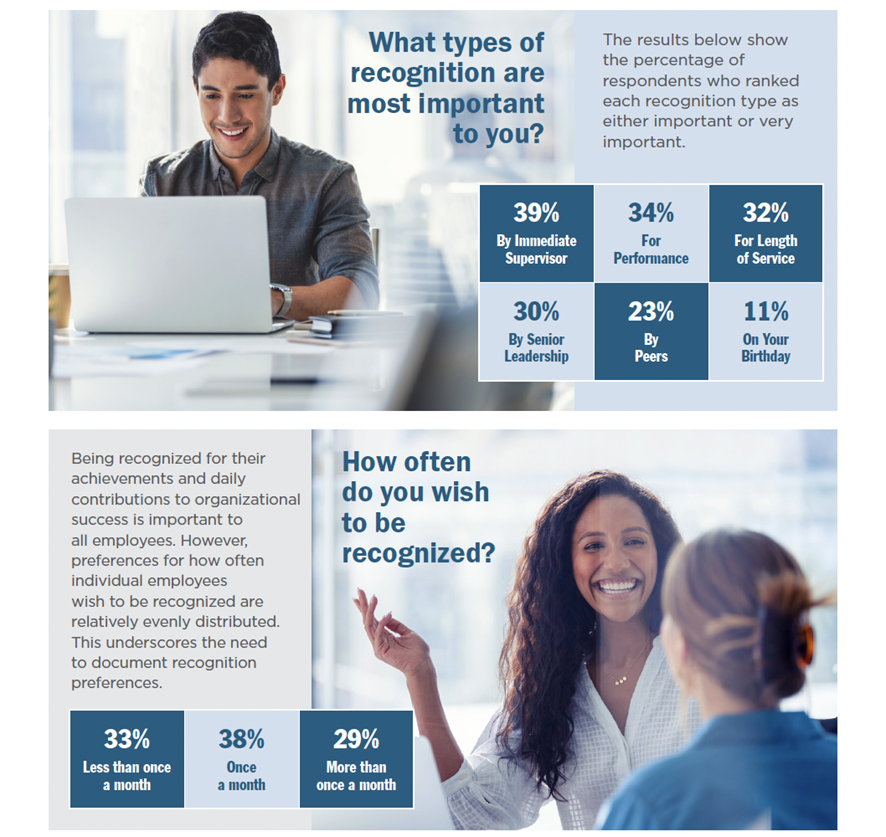
Download
 hbspt.cta.load(123973, 'a0754c01-d04e-402f-8670-13acf88f0f23', {"useNewLoader":"true","region":"na1"});
hbspt.cta.load(123973, 'a0754c01-d04e-402f-8670-13acf88f0f23', {"useNewLoader":"true","region":"na1"});
RECOGNITION SATISFACTION
The employee recognition industry, which began in the late nineteenth century, has evolved significantly over the past two decades following the advent of cloud-based technology. The Society for Human Resource Management (SHRM) reported that 89% of organizations in North America had an employee recognition program, compared to 68% in Asia and 65% in Europe. As the results below show, employees are generally more satisfied with recognition received from their current employer over that of their last employer. However, there is still much room for improvement. More than a third of employees either are not satisfied or are unsure about their satisfaction with recognition from their current or former employer.
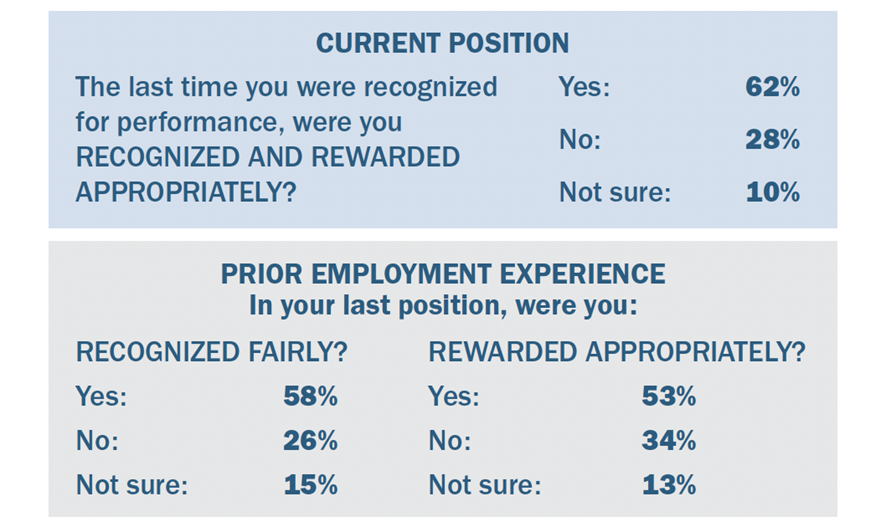
Download
 hbspt.cta.load(123973, 'a0754c01-d04e-402f-8670-13acf88f0f23', {"useNewLoader":"true","region":"na1"});
hbspt.cta.load(123973, 'a0754c01-d04e-402f-8670-13acf88f0f23', {"useNewLoader":"true","region":"na1"});
THE IMPACT OF RECOGNITION ON RECRUITING & RETENTION
With more than a third of employees either unsatisfied or unsure about their satisfaction with the recognition they receive at work, integrating employee recognition into recruitment and retention programs represents a significant opportunity for competitive differentiation.
Recognition, appreciation and respect during the hiring process (or lack thereof) topped the list of reasons for accepting or rejecting of job offers, and this area was the second most important driver of willingness to leave an employer.
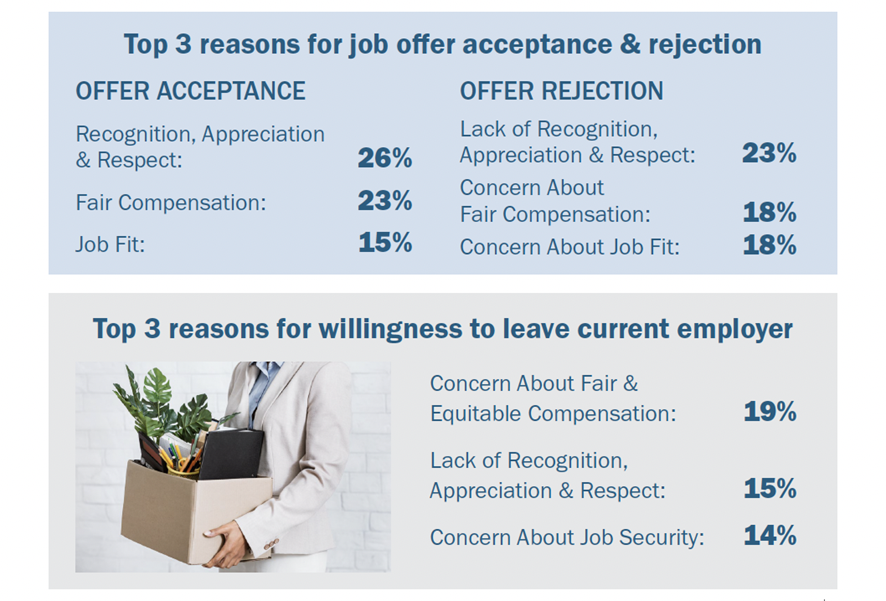
Download
 hbspt.cta.load(123973, 'a0754c01-d04e-402f-8670-13acf88f0f23', {"useNewLoader":"true","region":"na1"});
hbspt.cta.load(123973, 'a0754c01-d04e-402f-8670-13acf88f0f23', {"useNewLoader":"true","region":"na1"});
THE IMPACT OF ONBOARDING EXPERIENCES
Employee recognition, by definition, is the timely, informal or formal acknowledgment of a person’s behavior, effort or business result that supports the organization’s goals and values and that exceeds their manager’s normal expectations. Effective recognition requires one-toone communication and feedback, particularly in the early stages of employment. Onboarding experiences, which profoundly influence early retention rates, provide an opportunity for an employee to evaluate and assess the culture of their new employer. To improve early retention, successful onboarding programs include proactive feedback mechanisms and recognition for individual accomplishments.
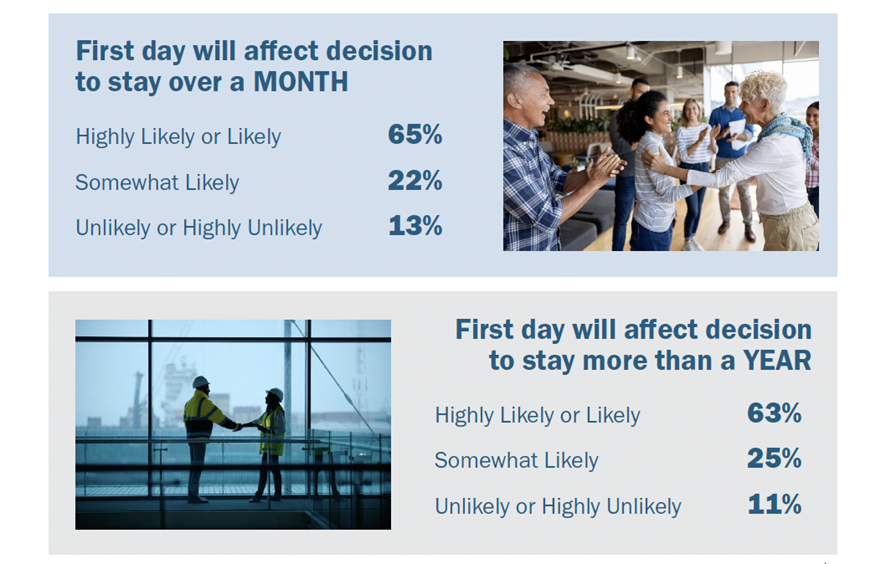
Download
 hbspt.cta.load(123973, 'a0754c01-d04e-402f-8670-13acf88f0f23', {"useNewLoader":"true","region":"na1"});
hbspt.cta.load(123973, 'a0754c01-d04e-402f-8670-13acf88f0f23', {"useNewLoader":"true","region":"na1"});
ROUNDTABLE KEY TAKEAWAYS
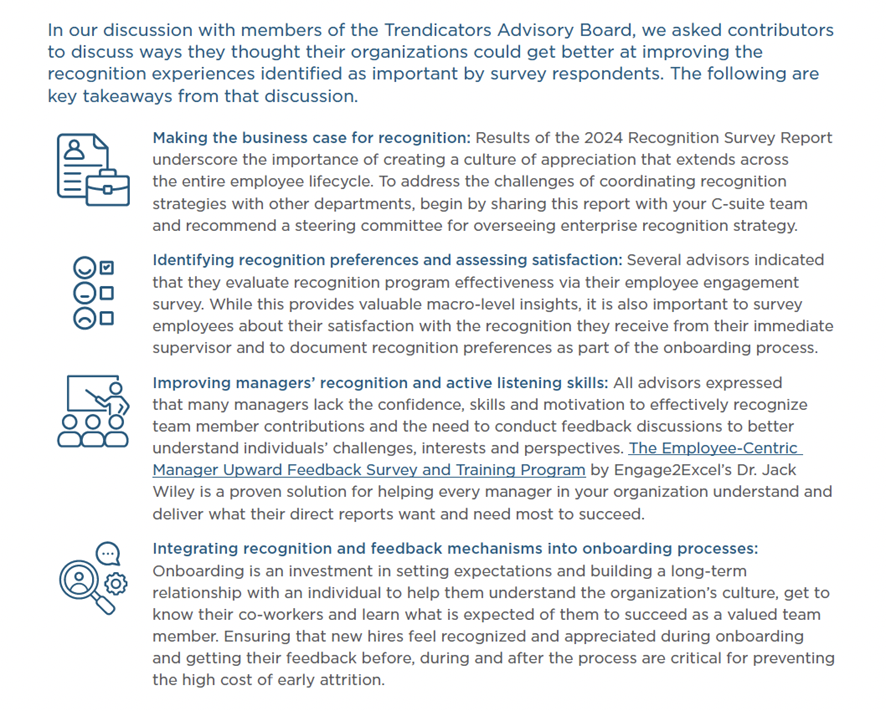
Download
 hbspt.cta.load(123973, 'a0754c01-d04e-402f-8670-13acf88f0f23', {"useNewLoader":"true","region":"na1"});
hbspt.cta.load(123973, 'a0754c01-d04e-402f-8670-13acf88f0f23', {"useNewLoader":"true","region":"na1"});